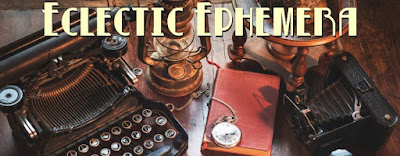Dear me, has it really been three months since my last post? I suppose there's no getting away from the fact that I've had something of an impromptu blogging break, but here I am - like the proverbial bad penny - turning up again and I must say it's already beginning to feel like I've never been away. Let's hope I can sustain that feeling, get back to a post every once in a while and not become stuck in another rut!
So, what has caught my vintage eye (I actually have two you know) in the last few weeks? Read on to find out!
Secret German WW2 code machine found on eBay
In my local seaside town, no less, came the discovery at the end of May of a part of the hugely important and super-rare coding machine used by the Germans in the Second World War - the Lorenz encryptor, bigger and even more complex brother of the famous Enigma machines. Discovered, in of all places, eBay! Misidentified as a telegraph keyboard, and up for auction at a mere £9.50, it was only sheer luck that the National Museum of Computing at Bletchley Park came across it - sitting in the seller's garage under a pile of junk! Surely this must rank as one of the ultimate eBay "finds"?! Well done to those eagle-eyed museum chaps for spotting this important part of computing and Second World War history, even if it is incomplete. Proof, if proof were needed, that there are still treasures to be found on that site - and on that note, while we're all searching around for that next bargain, keep an eye out for the Lorenz's motor, which is still yet to be found.
Secret WW2 wireless station in Norwich gets heritage protection
In related news a Second World War messaging post, one of 30 set up at the behest of Churchill in the face of the expected invasion of Britain in 1940, has been given listed status following its rediscovery in a disused Norfolk country house in 2012. One of only twelve so far discovered, it was sadly damaged by fire in 2014 but with this latest news and the encouraging noises being made by Historic England (previously English Heritage) one hopes that it can be restored and opened to the public as a museum detailing that pivotal point in our nations history and the important part these "In Stations" and there civilian operators would have played had the worst happened.
Czech World War Two pilot flies Spitfire once again
One man doing his best among hundreds to ensure the worst did not happen was Czech fighter pilot Emil Bocek, who trained as a teenage ground mechanic in 1940 before going on to earn his wings and fly Spitfires in combat from 1944. Later rising to the rank of General and now aged 93, he returned to Biggin Hill last month to fly a dual-control Spitfire over the skies of South London - the first time he's taken the controls of that wonderful aircraft in 70 years. Dobré pro vás, General Bocek!
Work begins on Eric robot resurrection
| source |
War hero's plane to fly at RNAS Culdrose Air Day after being restored by his grandsons
This last article is an absolute pip, just the kind of feel-good vintage news story I enjoy featuring on the blog. In this four-year centenary of the First World War there have been - and no doubt will continue to be - many such stories of descendants of Great War combatants uncovering fascinating accounts or honouring their relatives in some way (and rightly so!). This story of two brothers recreating the very aeroplane their grandfather flew in the Royal Naval Air Service during the Gallipoli campaign is a particularly stirring example and I'm delighted to see them make a success of it in time for a local air display. A more perfect way of honouring their grandfather's memory and providing an important glimpse into his life and exploits in the RNAS I couldn't imagine. Well done chaps!
That's me done for this post, then, but I sincerely hope and intend it not to be my last for another three months! I'm looking forward immensely to getting back into this blogging racket and with stories like these to choose from I certainly shouldn't be short of inspiration. Until next time folks, tinkerty-tonk!

